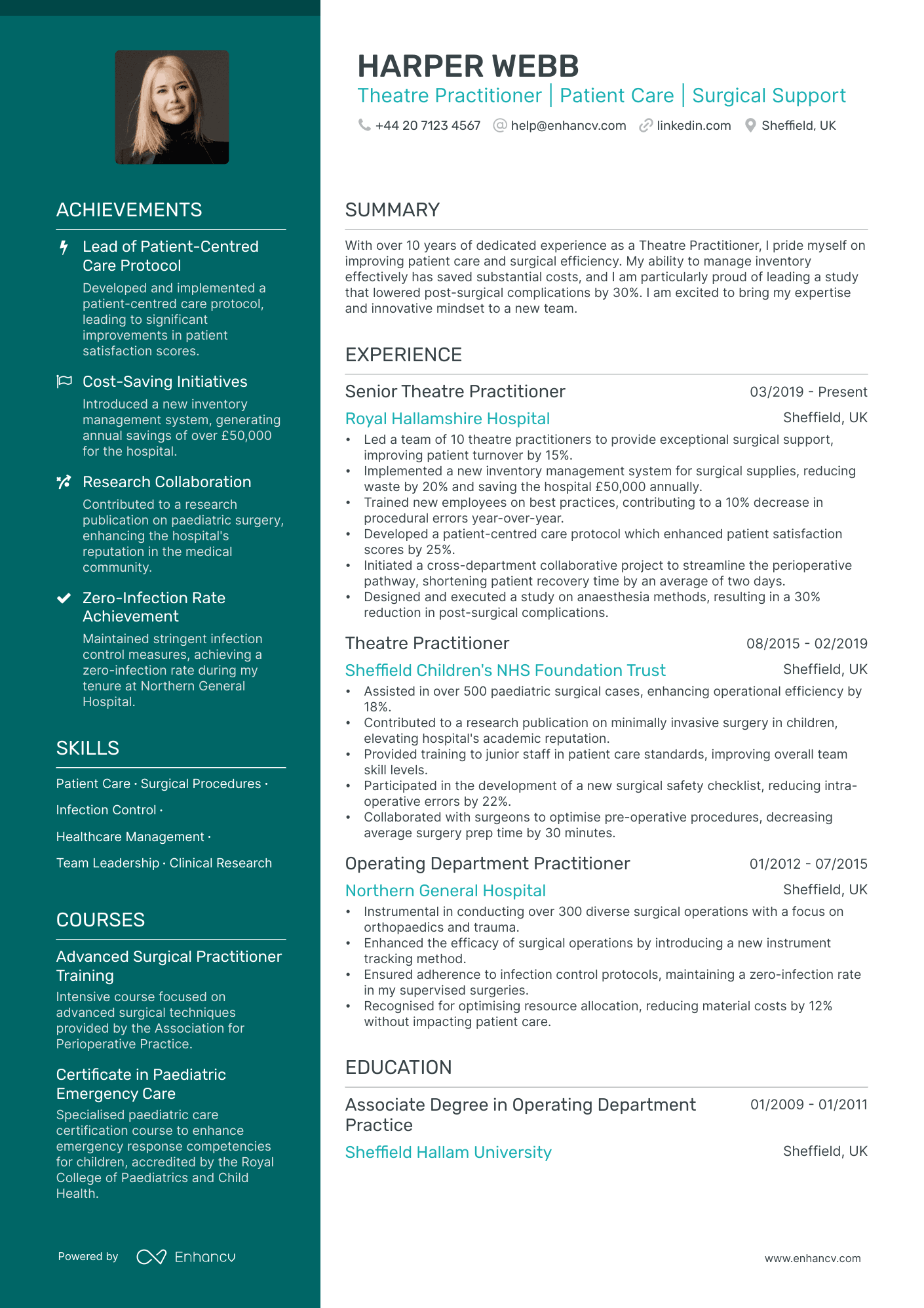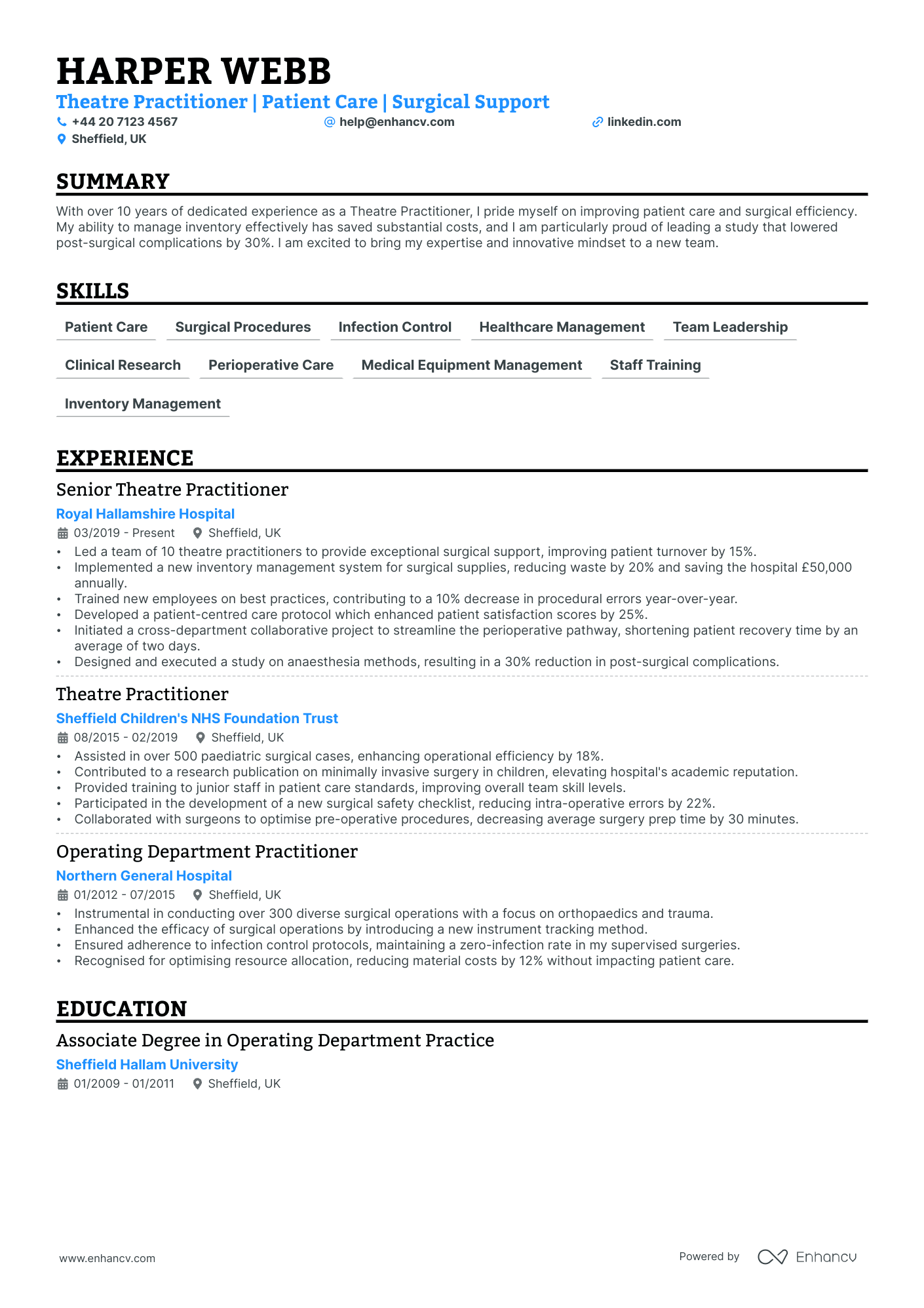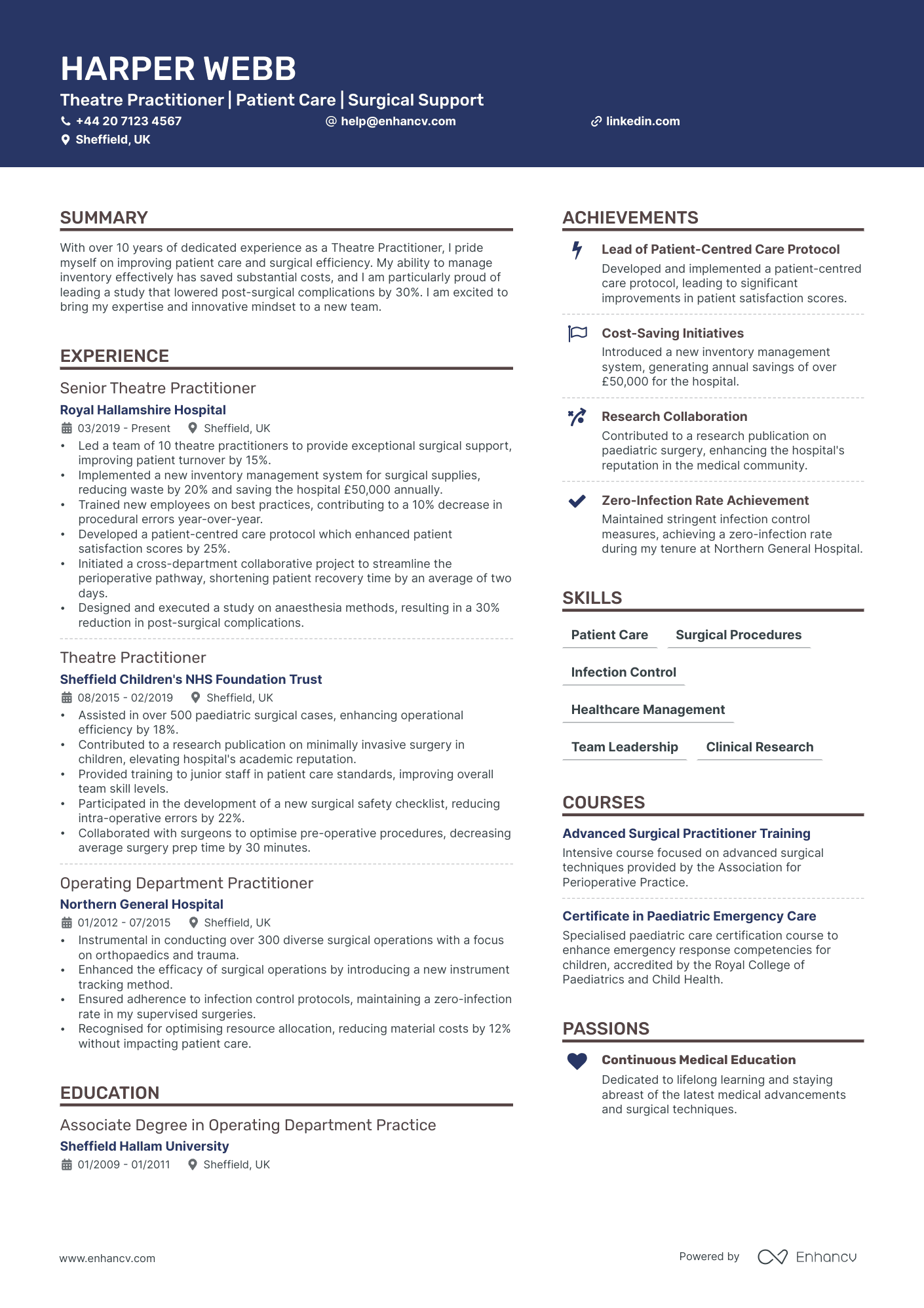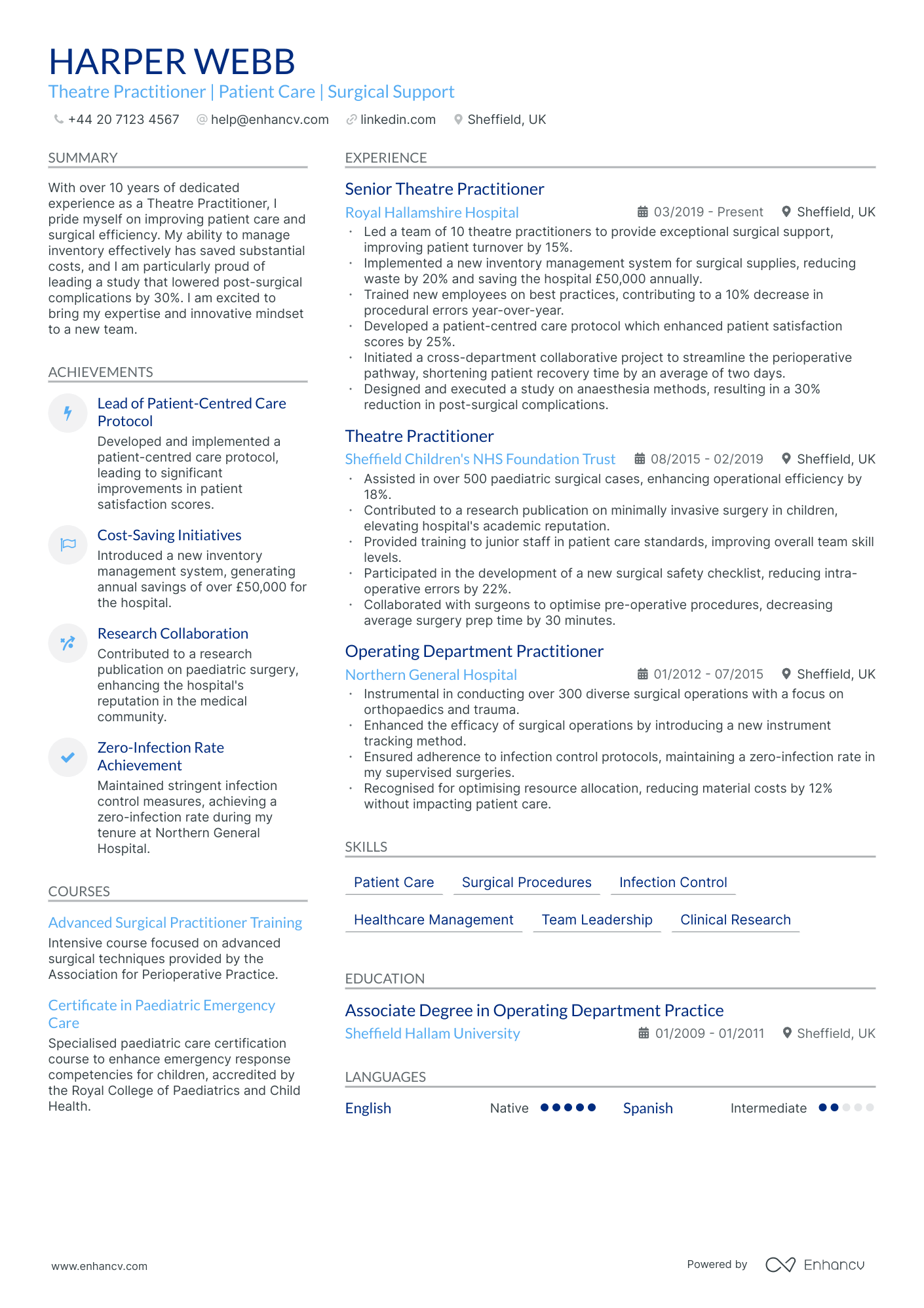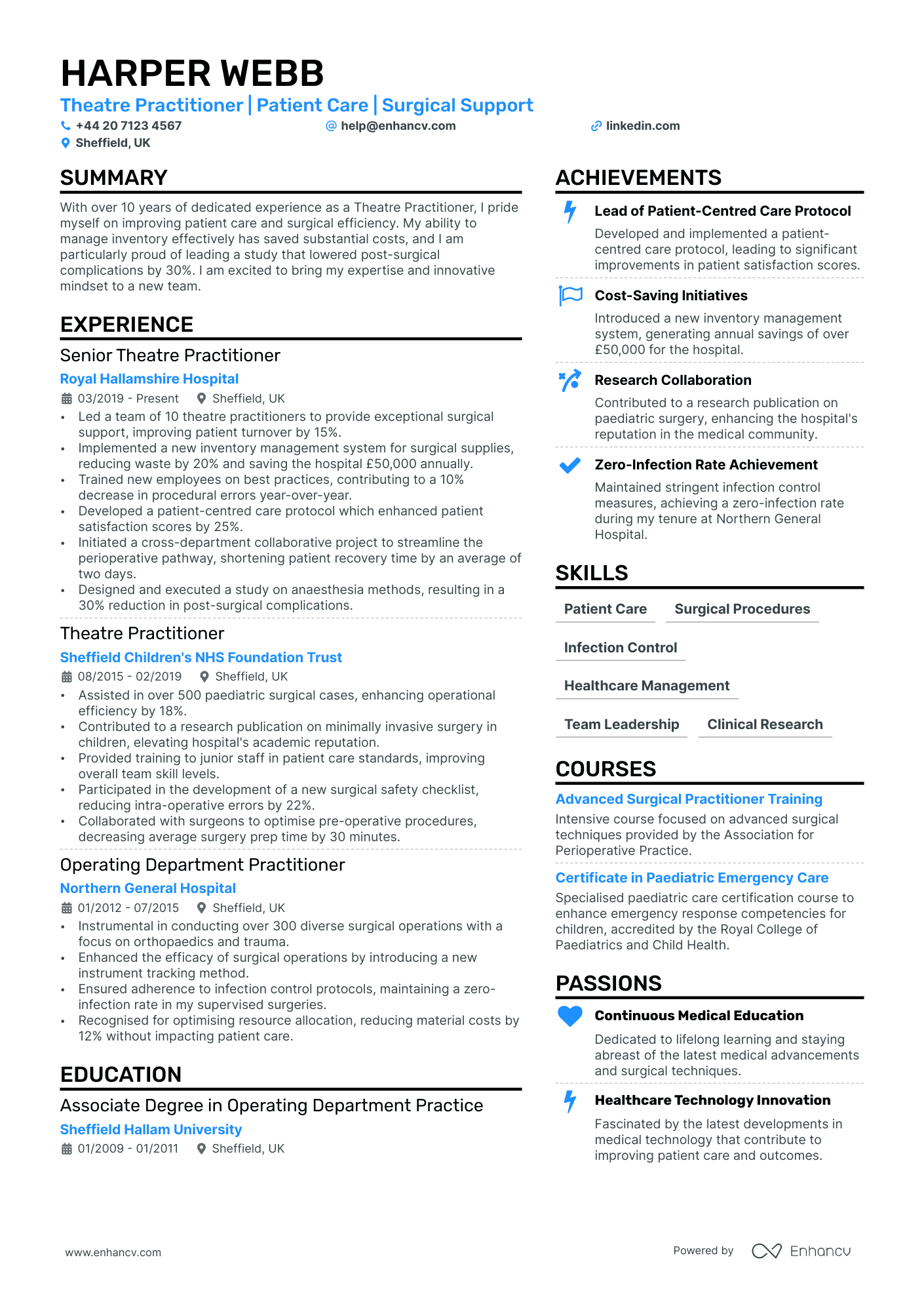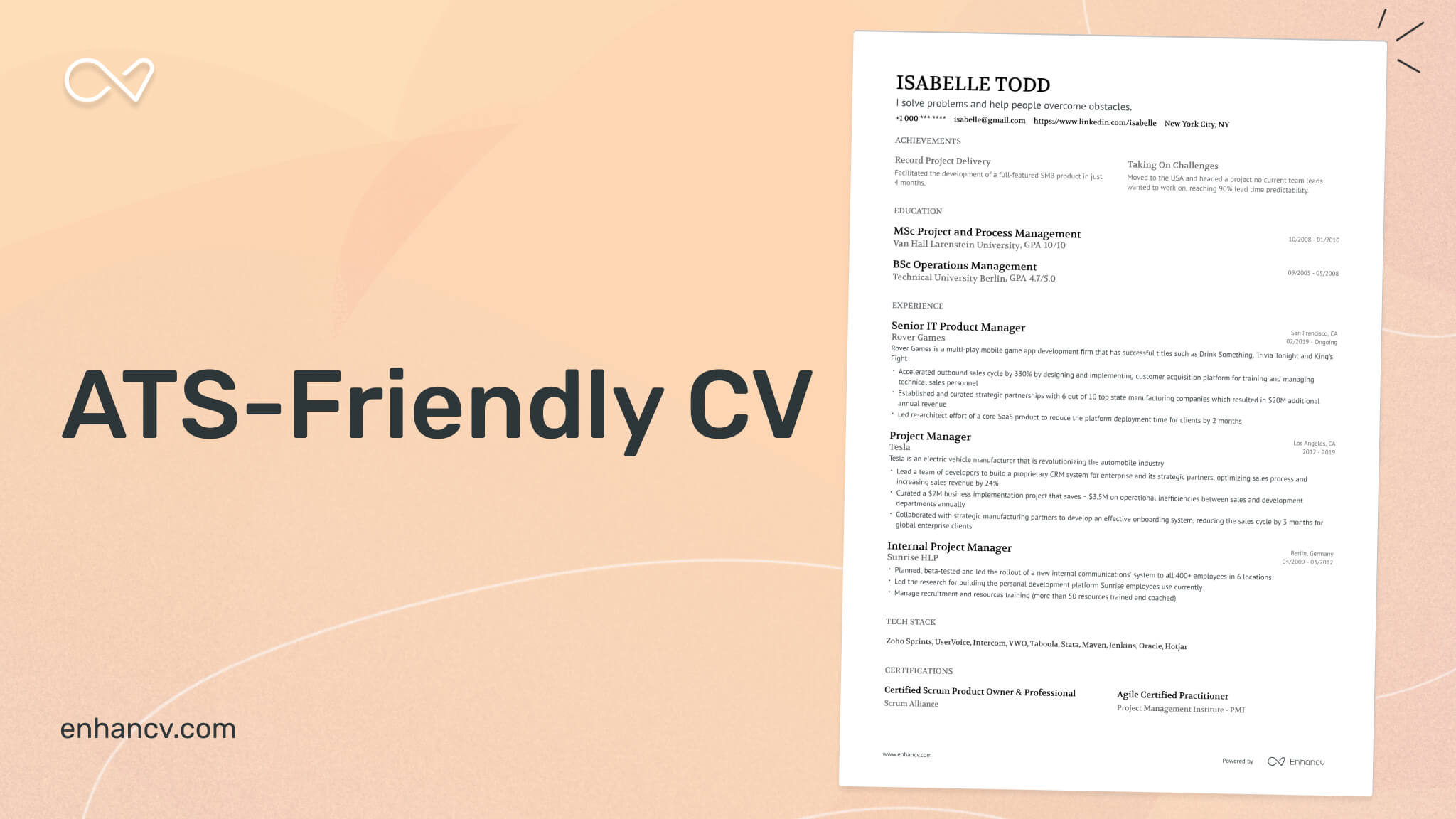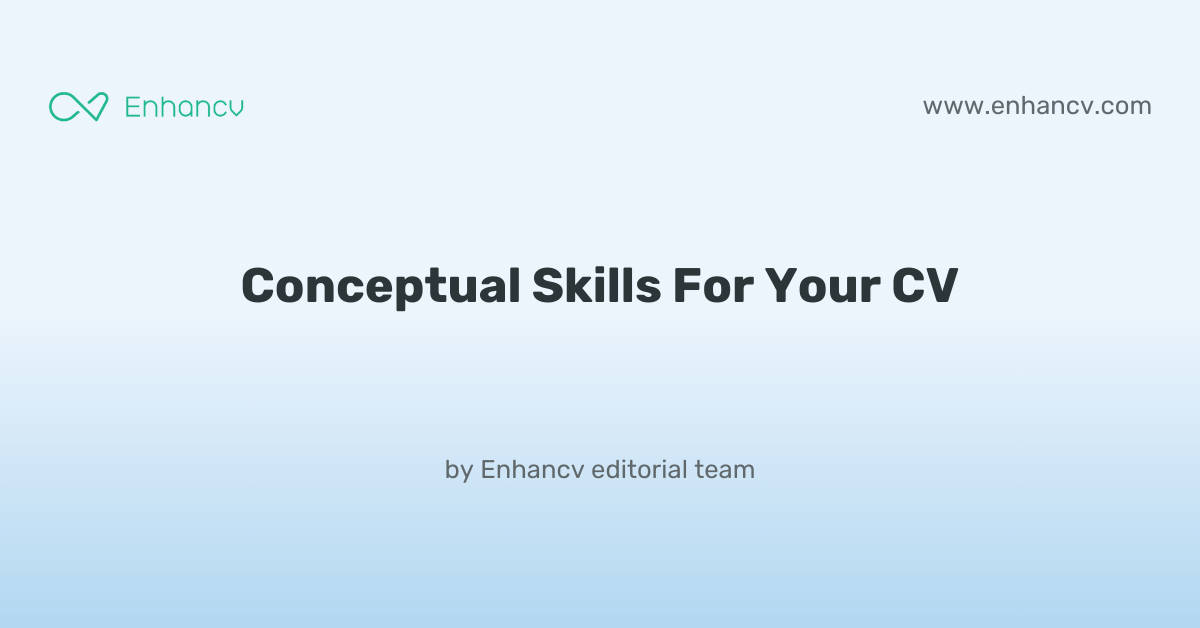One specific CV challenge faced by theatre professionals is crafting a document that effectively showcases their diverse skill set to potential directors and casting agents. Our guide offers tailored advice and examples to highlight your unique talents, ensuring your CV stands out in the competitive world of performing arts.
- Design and format your professional theatre CV;
- Curate your key contact information, skills, and achievements throughout your CV sections;
- Ensure your profile stays competitive by studying other industry-leading theatre CVs;
- Create a great CV even if you happen to have less professional experience, or switching fields.
When writing your theatre CV, you may need plenty of insights from hiring managers. We have prepared industry-leading advice in the form of our relevant CV guides.
Structuring your theatre CV layout: four factors to keep in mind
There are plenty of best practices out there for your CV layout and design. At the end of the day, a clear format and concise CV message should be your top priority. Use your CV design to enhance separate sections, bringing them to the forefront of recruiters' attention. At the same time, you can write content that:- Follows the reverse chronological order in the experience section by first listing your most recent jobs;
- Incorporates your contact information in the header, but do skip out on the CV photo for roles in the UK;
- Is spotlighted in the most important sections of your CV, e.g. the summary or objective, experience, education, etc. to show just how you meet the job requirements;
- Is no longer than two-pages. Often, the one-page format can be optimal for your theatre CV.
Before submitting your CV, you may wonder whether to export it in Doc or PDF. With the PDF format, your information and layout stay intact. This is quite useful when your CV is assessed by the Applicant Tracker System (or the ATS) . The ATS is a software that scans your profile for all relevant information and can easily understand latest study on the ATS , which looks at your CV columns, design, and so much more.
PRO TIP
Use bold or italics sparingly to draw attention to key points, such as job titles, company names, or significant achievements. Overusing these formatting options can dilute their impact.
The top sections on a theatre CV
- Personal Details to provide contact info and basic identification.
- Performance Experience showcasing the roles played and shows participated in.
- Training and Education to outline formal acting training and qualifications.
- Skills Set to highlight specific acting abilities and related talents.
- References to offer contacts for professional recommendations.
What recruiters value on your CV:
- Highlight your most prominent roles and achievements in recent productions, focusing on the parts that demonstrate your range as an actor and collaborative nature within a theatre company.
- Include your formal training and workshops, detailing the specific skills acquired that enhance your versatility and adaptability in theatre settings.
- Emphasise your vocal and physical attributes that align with theatrical demands, such as projection, dialect mastery, dancing abilities, and stage combat experience.
- Detail your understanding and experience with different theatrical styles and genres, from classical Shakespearean plays to contemporary drama, to showcase your adaptability.
- Provide a concise personal statement that captures your passion for theatre, your artistic ethos, and what makes you distinct, aiming to spark the interest of casting directors and producers.
Recommended reads:
Our checklist for the must-have information in your theatre CV header
Right at the very top of your theatre CV is where you'd find the header section or the space for your contact details, headline, and professional photo. Wondering how to present your the name of the city you live in and the country abbreviation as your address;
- are tailored to the role you're applying for by integrating key job skills and requirements;
- showcase what your unique value is, most often in the form of your most noteworthy accomplishment;
- select your relevant qualifications, skills, or current role to pass the Applicant Tracker System (ATS) assessment. Still not sure how to write your CV headline? Our examples below showcase best practices on creating effective headlines:
Examples of good CV headlines for theatre:
- "Lead Actor - 'Hamlet' | Classical and Contemporary Theatre | LAMDA Certified | 10 Years of Experience"
- "Musical Theatre Performer - 'Elphaba in Wicked' | Vocal Range: Soprano | Dance: Ballet, Jazz | 8 Years on Stage"
- "Stage Director - 'The Crucible' | Innovative Staging | Drama School Graduate | 15+ Years in Theatre Direction"
- "Theatre Technician - 'Phantom of the Opera' | Lighting and Sound Design | BTEC Qualified | 5 Years Industry Expertise"
- "Costume Designer - 'The Lion King' | Historical and Modern Wardrobe | BA (Hons) Fashion | 12 Years Tailoring"
- "Set Designer - 'Les Misérables' | Scenic Artistry | CAD Proficiency | MFA Stage Design | 7 Years Creative Builds"
What's the difference between a theatre CV summary and objective
Why should it matter to you?
- Your theatre CV summary is a showcasing your career ambitions and your unique value. Use the objective to answer why your potential employers should hire you based on goals and ambitions. The objective is the ideal choice for candidates who happen to have less professional experience, but still meet some of the job requirements.
Before you select which one will be more relevant to your experience, have a look at some industry-leading CV summaries and objectives.
CV summaries for a theatre job:
- Seasoned Theatre Director with over a decade of experience in orchestrating high-calibre productions for esteemed stages across London. Possesses a robust repertoire of theatrical techniques, a creative vision for stagecraft, and a proven track record of delivering critically acclaimed performances including a sell-out Shakespearean festival.
- Acclaimed Costume Designer with 8 years of experience creating visually stunning and period-accurate garments for over 20 major theatrical productions. Skilled in tailoring, fabric selection, and historical research, with particular recognition for a nationally awarded Victorian-era play.
- Former Marketing Executive eager to transpose 7 years of branding expertise into a new career path within theatre management. Brings a wealth of knowledge in audience engagement strategies, digital promotion, and event coordination, coupled with a deep appreciation for the performing arts.
- Professional Dancer transitioning to theatre arts, armed with 5 years of experience performing in international dance companies. Offers a unique perspective on movement and choreographic storytelling, motivated to contribute to ensemble pieces and innovative stage productions.
- Aspiring playwright with a passion for storytelling and contemporary theatre, seeking an opportunity to learn and grow within a dynamic troupe. Eager to bring fresh ideas and perspectives to the writing team and to develop skills under the mentorship of seasoned industry professionals.
- Dynamic individual with a profound interest in stagecraft and production, aiming to embark on a career in theatre arts. Keen to apply a strong background in project management and communication to support and learn from an established theatre company while contributing to its artistic endeavors.
Narrating the details of your theatre CV experience section
Perhaps you've heard it time and time again, but, how you present your experience is what matters the most. Your CV experience section - that details your work history alongside your accomplishments - is the space to spotlight your unqiue expertise and talents. So, avoid solely listing your responsibilities, but instead:
- adverts' keywords and integrate those in your experience section;
- Use your CV to detail how you've been promoted in the past by including experience in the reverse chronological order.
Before you start writing your theatre CV experience section, dive into some industry-leading examples on how to structure your bullets.
Best practices for your CV's work experience section
- List your most relevant theatre experiences first, highlighting your involvement and the significance of the production you were part of. Mention the title of the production, your role, and the name of the theatre or company.
- Focus on variety by showing a range of different roles and production styles you've worked on, which might include dramas, musicals, and experimental theatre. This demonstrates versatility and adaptability in your craft.
- Include key achievements or milestones, such as award nominations, critically acclaimed performances, or participation in significant theatre festivals. Detail any recognitions or positive reviews you have received, linking them to specific roles or productions.
- Specify any specialised skills that are relevant to the theatre, such as stage combat, dance, puppetry or fluency in other languages. Frame these skills in the context of how they were applied in specific productions.
- Be explicit about the genre and scale of productions to give context about where your experience lies, whether in fringe, West End, regional theatre, or touring shows. Define the scope of the productions you have been involved with to showcase your flexibility and experience.
- If you've worked in various capacities other than acting, such as directing, producing or stage management, include these roles to show your comprehensive understanding of theatre. Clearly state the different responsibilities undertaken in each role outside of acting.
- Note any training or workshops you've participated in, especially those led by renowned theatre professionals or institutions. Cite specific courses and the skills they have helped you develop that are pertinent to the theatre industry.
- Include collaborations with esteemed directors, playwrights or actors to highlight your network and the calibre of professionals you've worked with. Discuss the nature of these collaborations and how they have enriched your experience as a theatre professional.
- Mention any additional responsibilities you've taken on during productions, such as mentoring new actors, contributing to set design, or community outreach. Show how these experiences have broadened your contribution to the field and theatre community.
- Directed a team in the production of 'Shakespeare in the Park', which saw a 30% increase in community engagement due to innovative stage design.
- Implemented a new ticketing system that streamlined the booking process, improving customer satisfaction scores by 40% over a six-month period.
- Collaborated with local schools to develop educational theatre programs, enriching the curriculum for over 500 students annually.
- Choreographed and produced over 25 large-scale musicals, consistently achieving sold-out shows and receiving multiple awards for artistic direction.
- Pioneered the use of digital set design, leading to a 50% reduction in set production costs and a more dynamic visual experience for audiences.
- Spearheaded a fundraising campaign that generated £150,000, allowing for renovations that improved accessibility and enhanced the overall theatre-goer experience.
- Developed an apprenticeship program that has successfully mentored over 100 aspiring theatre professionals, boosting the theatre's reputation as an industry leader in talent development.
- Cultivated key partnerships with national theatre networks, driving a 20% expansion in co-production opportunities and artist exchanges.
- Initiated the use of sustainable materials in set construction, reducing the theatre's carbon footprint by 35%.
- Curated a diverse programme of international theatre, resulting in a 25% increase in global visitors and a heightened profile for the theatre in international arts festivals.
- Implemented comprehensive staff training, elevating customer service standards and achieving a 90% satisfaction rate in patron surveys.
- Led a technology integration project that enhanced the audio-visual experience, significantly increasing the technical capabilities for complex productions.
- Managed high-profile West End productions, ensuring all aspects of the theatrical experience met the highest standards of excellence and professionalism.
- Orchestrated a digital marketing campaign that increased online ticket sales by 45%, reaching new demographics and expanding the theatre’s online presence.
- Negotiated contracts with major theatrical agencies, securing top talent and favourable terms that contributed to the theatre's financial stability.
- Coordinated the logistics of touring productions, efficiently managing schedules and transport for casts and crews of up to 50 people across various locations.
- Revitalized the in-house training programme for technical staff, leading to a 60% improvement in the execution speed of stage changes.
- Established a community outreach initiative that increased local participation in the arts by bringing theatre to underprivileged areas.
- Oversaw the renovation of the theatre's technical infrastructure, ensuring cutting-edge lighting and sound that enhanced production quality and audience immersion.
- Fostered a collaborative work environment that encouraged staff innovation, yielding fresh, original stage productions acclaimed by critics.
- Engaged in decisive budget management, reducing operational costs by 20% without compromising on the quality of theatrical productions.
- Implemented a new staff hiring strategy that attracted and retained top industry professionals, reinforcing the theatre’s status as a premier performance venue.
- Enhanced the subscription model to include VIP membership tiers, which increased annual recurring revenue by 30% and solidified the theatre's financial foundation.
- Overhauled the patron feedback system to improve service delivery and drive innovations in customer experience, leading to a 95% ticket holder retention rate.
How to ensure your theatre CV stands out when you have no experience
This part of our step-by-step guide will help you substitute your experience section by helping you spotlight your skill set. First off, your ability to land your first job will depend on the time you take to assess precisely how you match the job requirements. Whether that's via your relevant education and courses, skill set, or any potential extracurricular activities. Next:
- Systematise your CV so that it spotlights your most relevant experience (whether that's your education or volunteer work) towards the top;
- Focus recruiters' attention to your transferrable skill set and in particular how your personality would be the perfect fit for the role;
- Consider how your current background has helped you build your technological understanding - whether you've created projects in your free time or as part of your uni degree;
- Ensure you've expanded on your teamwork capabilities with any relevant internships, part-time roles, or projects you've participated in the past.
Recommended reads:
PRO TIP
Describe how each job helped you grow or learn something new, showing a continuous development path in your career.
Mix and match hard and soft skills across your theatre CV
Your skill set play an equally valid role as your experience to your application. That is because recruiters are looking for both:
- hard skills or your aptitude in applying particular technologies
- soft skills or your ability to work in a team using your personal skills, e.g. leadership, time management, etc.
Are you wondering how you should include both hard and soft skills across your theatre CV? Use the:
- skills section to list between ten and twelve technologies that are part of the job requirement (and that you're capable to use);
- strengths and achievements section to detail how you've used particular hard and soft skills that led to great results for you at work;
- summary or objective to spotlight up to three skills that are crucial for the role and how they've helped you optimise your work processes.
One final note - when writing about the skills you have, make sure to match them exactly as they are written in the job ad. Take this precautionary measure to ensure your CV passes the Applicant Tracker System (ATS) assessment.
Top skills for your theatre CV:
Acting techniques
Voice and diction
Improvisation
Movement and dance
Stage combat
Script analysis
Set design
Lighting design
Costume and makeup design
Directing
Creativity
Teamwork
Communication
Adaptability
Problem-solving
Time management
Attention to detail
Physical stamina
Patience
Empathy
PRO TIP
Order your skills based on the relevance to the role you're applying for, ensuring the most pertinent skills catch the employer's attention first.
Education and more professional qualifications to include in your theatre CV
If you want to showcase to recruiters that you're further qualified for the role, ensure you've included your relevant university diplomas. Within your education section:
- Describe your degree with your university name(-s) and start-graduation dates;
- List any awards you've received, if you deem they would be impressive or are relevant to the industry;
- Include your projects and publications, if you need to further showcase how you've used your technical know-how;
- Avoid listing your A-level marks, as your potential employers care to learn more about your university background.
Apart from your higher education, ensure that you've curated your relevant certificates or courses by listing the:
- name of the certificate or course;
- name of the institution within which you received your training;
- the date(-s) when you obtained your accreditation.
In the next section, discover some of the most relevant certificates for your theatre CV:
PRO TIP
Focus on describing skills in the context of the outcomes they’ve helped you achieve, linking them directly to tangible results or successes in your career.
Recommended reads:
Key takeaways
Your successful job application depends on how you well you have aligned your theatre CV to the job description and portrayed your best skills and traits. Make sure to:
- Select your CV format, so that it ensures your experience is easy to read and understand;
- Include your professional contact details and a link to your portfolio, so that recruiters can easily get in touch with you and preview your work;
- Write a CV summary if you happen to have more relevant professional experience. Meanwhile, use the objective to showcase your career dreams and ambitions;
- In your CV experience section bullets, back up your individual skills and responsibilities with tangible achievements;
- Have a healthy balance between hard and soft skills to answer the job requirements and hint at your unique professional value.
